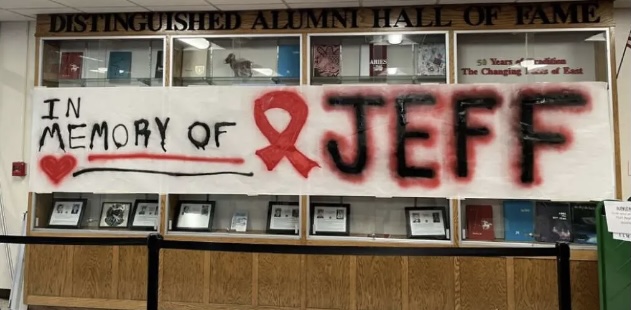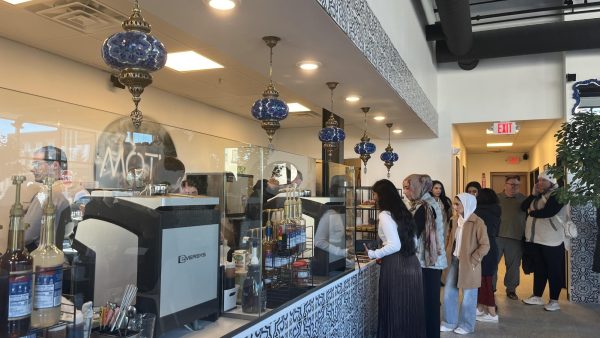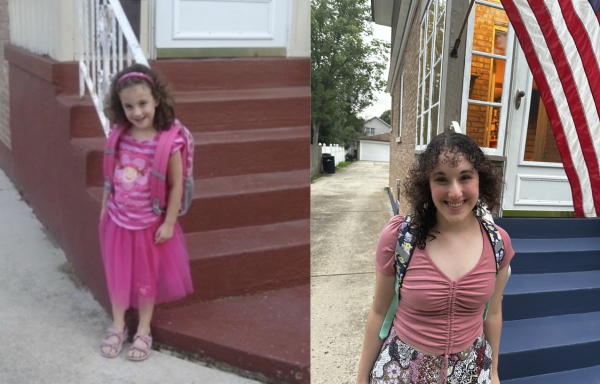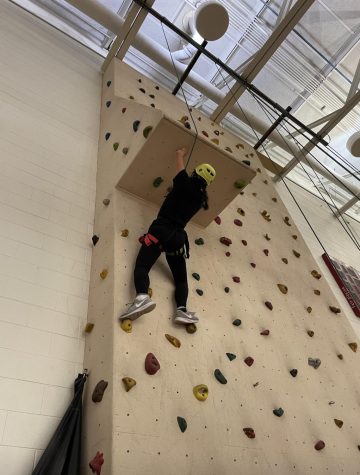Glenbard East Swept Off Their Feet with Teenage Grief
Banner made by students of East hangs at door 1 the week after Jeff Eatons passing.
While some saw his energy fill up their class, and others saw him blossoming outside of school as he shared his authentic self, the tragic and unexpected death of Jeff Eaton affected nearly everyone at East regardless of their relationship with him.
Some might say the news of his short lived life swept everyone off their feet.
As someone who experienced grief at a young age, after the passing of my father when I was 14, I learned that sharing my story was helpful. At first, I tried to bottle up the emotions that boiled inside of me. The choices I made were unhealthy, and I realized I needed to get outside help and talk to someone.
Six months after his death, I became a participant in a grief support group at Parkview Community Church in Glen Ellyn. At first I was the only young person in the group, but eventually I became a leader of a different group geared toward teens and young adult. This helped me process my own grief journey as I saw my experiences reflected in the experiences of others.
I struggled most with coping with the lost memories and time I had with my dad. I told everything to my father, and having someone taken away so quickly was hard. My father wasn’t going to see me get my license, graduate, or see me grow into an adult. Coping with that I learned and had to remind myself that I should be grateful for the time I had with him, and the memories I shared with him can be seen in a positive manner rather than negative moments.
Leading a support group in 2021, I found out that although most teenagers will be vulnerable about anything on social media, it is quite hard for them to be vulnerable in person without a screen masking their face.
Grieving teens often struggle with regulating their emotions due to the loss happening at such a young age. Sometimes we are scared to share our feelings out of fear because it might be seen as a weakness.
When I first entered a support group, I sat in a circle with adults. Some may think it was weird (me sitting among grandmothers and people older than my parents); however, it did not matter because the other grievers and I all were trying to float in the same boat of grief, and we all needed each other as a paddle to move forward.
I didn’t expect much with the support group. I wanted to hear other people’s stories and make note of how they cope with their journey. I discovered that being in my darkest times, the people who stood around me in the group truly guided me toward the light.
We all yearned for the strength to speak openly to each other, and remind ourselves that we weren’t alone. The entire point of support groups is to give others a voice to speak, while also being heard from others, which is crucial when one grieves.
These sensitive topics are difficult to talk about, but they need to be heard. Due to the internet/social media moving so quickly, opinions fly at the speed of light; therefore, it is important to consider finding an in-person outlet.
According to Stacy Tzouras, students can find help at school by asking to speak to a social worker. A student can email their counselor or go to the counseling office and ask to meet with a social worker.
Tzouras said it is important to reach out in person instead of just relying on social media when emotional support is needed.
“Social media has influenced the way that people connect with one another,” she said. ”It is much easier for people to hide behind the image they want to show the world.”
“We are bombarded with information and sometimes misinformation that make it much harder to regulate emotions and sometimes also respond in a way to others that fuels connection and empathy,” Tzouras added.
It is important to see every angle of social media, whether negative or positive. With teenagers now, they find themselves early in the morning to bedtime flooded with notifications.
Instead of a clear announcement and remembrance of the passing of Jeff Eaton, the news was found on students’ social media platforms of simple rumors at first, but soon transformed into the truth causing students’ hearts to drop.
If one passes before they graduate high school or when they finally reach retirement, the idea of death is tragic, and no one can predict it. Crying on a carpet with rivers of tears, tossing out the last box of tissues, at that moment of grief, we truly feel alone, and those loops of emotions can make us go insane, but we need to learn that life is too short and being grateful for the time we had with our loved one is how we can grow.
When working with grieving students, Glenbard East social workers discuss ways of coping with emotions/grief in a healthy or unhealthy way. Some ways of coping are therapy, support groups, journaling, and many others. Unhealthy coping mechanisms can be drug/alcohol abuse, verbal/physical abuse, avoiding or denying the problem, and bottling up the emotions.
Through this journey, tides of our mind could come in brutal waves, but having therapy and support groups erase that rapid loneliness or guilt, overall can help enlighten one’s darkest moments.
According to the resources provided by Glenbard’s Social Workers, those examples of unhealthy practices lead to dead ends, but fixing the problem is easier said than done. Being able to talk to a person about our feelings isn’t easy. Trust is a large part of it, and many people close in their lives struggle with trust. And when we have no one to talk to about it, we can feel alone.
Further documents from the Social Workers explain that, grief makes us feel isolated and lost, one of the first actions as one grieves could start with unhealthy coping mechanisms. But when one reaches that dead end, turning around is all one can do. These coping ideas and practices are something a preteen to even a full grown adult learns overtime. Indeed, as someone who has been dealing with grief at a young age, I’ve learned that everyone grieves and copes differently, and there’s no instruction manual for one’s journey of grief.
From my experience working with other teenagers at support groups, sometimes grieving people need to be appreciative for the time they had with their loved one. Yes, they could’ve had them live a longer life, but there’s also the fact that they could have had them for an even shorter period of time. Sometimes you need to find that middle ground and be able to live in that medium state in order to process one’s own grieving journey.
With grieving times, using the resources at school and asking for help is crucial to developing a stronger community at Glenbard East. Remind ourselves that we are human and that none of us are alone.
Resources provided by Glenbard East Social Workers:
- Sympathy vs Empathy Video
- https://docs.google.com/presentation/d/1EeLgAEPPrJyeIkLbG1joWnVAM8P2BTjVW8S0nI0GrLg/edit#slide=id.p
- https://docs.google.com/document/d/1qyWLNRH5MeaBfl0nX_W8c3yHwMhI1zMLoxDVmfG_Q8k/edit
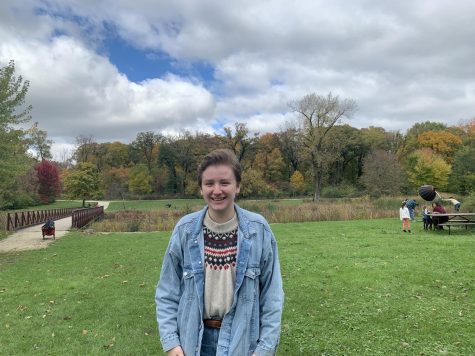
Lauren is a senior and this is her third year on the Echo. In addition to Echo, Lauren participates in Slam Club, German Club, Theatre and is President...



